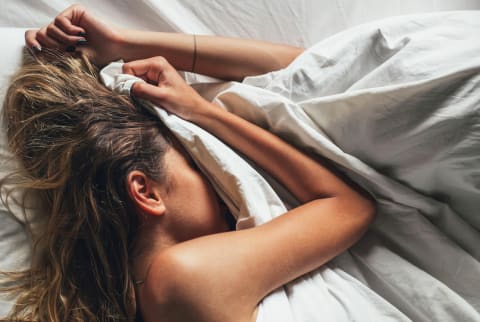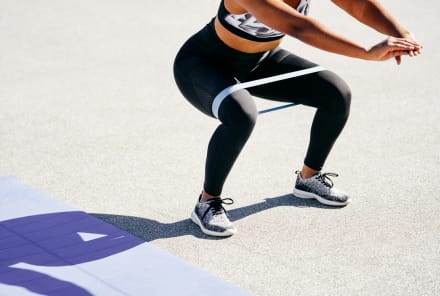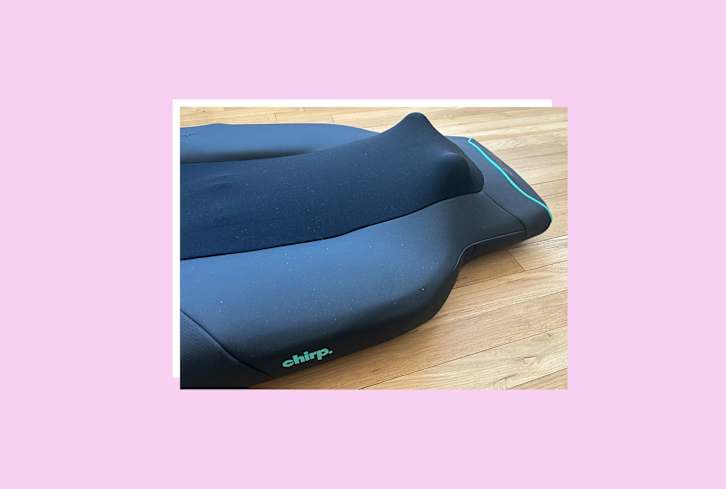Advertisement
5 Things That Make Your Sleep Score Plummet + How To Get It Back On Track


What's one thing professional athletes, data nerds, and health researchers have in common? They all use sleep trackers.
Sleep tracking is an increasingly popular, increasingly high-tech way to optimize your sleep (and, in turn, your health).
Trackers—typically a watch or ring—collect data on your heart rate, temperature, and movement scores during the night to assign you a sleep score. While not 100% accurate, these scores can give you an idea of how your sleep varies from evening to evening.
"It's more important to track trends over time rather than single nights," board-certified sleep medicine specialist Nishi Bhopal, M.D., tells mindbodygreen. Once you see your score go from 90 one week to 70 the next, it's a sign to investigate what could have caused the dip.
While everyone has different triggers, these are a few of the main reasons that sleep scores take a hit. Getting a failing grade? Take the outlined steps to relax your way back to an A+ snooze:
You're going to bed too late
We all have slightly different windows of time when our bodies want to be asleep (you've probably seen this described as your "chronotype"). If you push your bedtime to be later than your ideal window, your sleep score will suffer—even if you sleep in later in the morning to try to make up for it.
This is something I noticed when I wore an Oura ring for months: Getting eight hours of sleep starting at 10:30 p.m. yielded much better scores than getting eight hours starting at 11:30 p.m. or later. I consistently got less REM sleep and deep sleep on the nights when I went to bed later, even if the rest of my routine stayed exactly the same.
What to do: Having a late night out with friends or family every once in a while is no big deal and should be enjoyed. But if you're constantly tempted to stay up a little late watching TV or scrolling on your phone, naturopathic sleep doctor Catherine Darley, N.D., recommends setting a "bedtime alarm" an hour before your ideal bedtime to remind yourself it's time to start winding down.
You have racing thoughts at night
If you're busy running around all day, you might find that stressful thoughts and worries only have a chance to catch up with you once your head hits the pillow: precisely when you don't want them. These stressors can rev up your fight-or-flight response and trigger the release of cortisol, increasing your sleep latency1 (the amount of time it takes you to fall asleep). And the longer it takes to fall asleep, the more likely you are to start worrying about not sleeping enough, kick-starting a cycle that will show up in your metrics the next morning.
What to do: For a little extra help calming the mind before bed, you might want to try a sleep supplement that is formulated with calming ingredients.
Your bedroom is too bright
While a streetlight peeking through a bedroom window seems like it shouldn't be a big deal, research shows that even a little bit of light exposure is enough to shorten sleep, cause more frequent wakeups2, reduce REM and deep sleep, and heighten heart rate.3 This is one reason that people who work overnight shifts can have such a hard time getting into a healthy sleep rhythm.
What to do: Investing in blackout curtains is one surefire way to keep the lights out. There are simpler and more affordable tools that can help you maintain a darker sleep zone too. For example, research finds that wearing a sleep mask is enough to protect your deep sleep and improve your cognition and alertness the next day. Here are a few of the best options.
You're eating dinner too late
While sometimes you don't have a choice, eating a late dinner does get in the way of sleep quality. Consuming food (especially heavy foods) too close to bedtime means that you'll go to sleep still digesting—which will keep you up for longer and/or cause you to wake up more in the middle of the night. And that's not even accounting for any alcohol you drank during dinner...
What to do: You don't need to be a stickler about mealtime cutoffs, but most experts agree that wrapping up dinner roughly three hours before you plan to go to bed should give you enough time to digest. Eating dinner at the same time every night can also give your sleep score a little boost since the body loves a routine. On the occasions that you do need to eat later, prioritize lighter foods that are easier to digest and feature sleep-supporting ingredients like magnesium.
You're not moving enough during the day
Even on nights when you feel like you got good sleep, your tracker might tell you that you were actually tossing and turning more than you realized. A lack of physical activity during the day can spur restlessness at night since exercise tires the body out and helps the mind relax and de-stress.
What to do: Aim to move your body every day, in whatever way feels good to you. Doing resistance exercise, in particular, has been shown to help people spend 17 more minutes asleep per night, as well as fall asleep faster.
The takeaway
While sleep trackers aren't perfect, they can help alert you when some aspect of your sleep routine needs adjusting. Here are a few more habits that can help you raise your sleep score, and if you're in the market for a new tracker that delivers accurate data, head here.


















